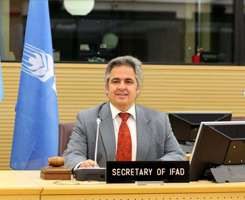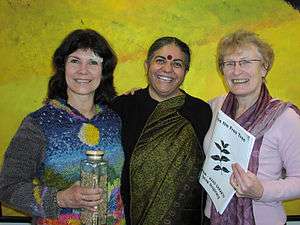IFOAM - Organics International
The International Federation of Organic Agriculture Movements (IFOAM - Organics International) is the worldwide umbrella organization for the organic agriculture movement, which represents close to 800 affiliates in 117 countries.[1]
| Formation | 1972 |
|---|---|
| Type | NGO |
| Headquarters | |
Region served | Global |
Membership | 710 members |
Official language | English |
Main organ | General Assembly |
| Website | www.ifoam.bio |
It declares its mission is to, "Lead, unite and assist the organic movement in its full diversity." and vision is the "worldwide adoption of ecologically, socially and economically sound systems, based on the Principles of Organic Agriculture".[1]
Among its wide range of activities, the federation maintains an organic farming standard, and an organic accreditation and certification service.
History

IFOAM - Organics International began in Versailles, France, on November 5, 1972, during an international congress on organic agriculture organized by the French farmer organization Nature et Progrès. The late Roland Chevriot, President of Nature et Progrès, took the initiative.[2][3] There were 5 founding members[3] representing different organizations: Lady Eve Balfour representing the Soil Association of Great Britain, Kjell Arman representing the Swedish Biodynamic Association, Pauline Raphaely representing the Soil Association of South Africa, Jerome Goldstein representing Rodale Press of the United States, and Roland Chevriot representing Nature et Progrès of France.
The aim of the new organization was reflected in the name: International Federation of Organic Agriculture Movements. The founders hoped that the federation would meet what they saw as a major need: a unified, organized voice for organic food, and the diffusion and exchange of information on the principles and practices of organic agriculture across national and linguistic boundaries. In 2015 the name of changed to IFOAM - Organics International.
Structure

The General Assembly of IFOAM - Organics International serves as the foundation of the organization. It elects the World Board of IFOAM - Organics International for a three-year term.[4] The World Board is a diverse group of individuals working voluntarily to lead IFOAM - Organics International. The current World Board was elected at the General Assembly of IFOAM in Istanbul which took place in October 2014. The World Board appoints members to official committees, working groups and task forces based upon the recommendation of the membership of IFOAM - Organics International. Member organizations also establish regional groups and sector specific interest groups.
International standing
IFOAM - Organics International actively participates in international agricultural and environmental negotiations with the United Nations and multilateral institutions to further the interests of the organic agricultural movement worldwide, and has observer status or is otherwise accredited by the following international institutions:
- ECOSOC Status with the United Nations General Assembly[5]
- The Food and Agriculture Organization of the United Nations (FAO)[6]
- United Nations Conference on Trade and Development (UNCTAD)[7]
- Codex Alimentarius Commission (FAO and World Health Organization)[8]
- United Nations Environment Program (UNEP)[9]
- The Organisation for Economic Co-operation and Development (OECD)
- International Labour Organization of the United Nations (ILO)[10]
- International Organization for Standardization (ISO)[11]
According to the One World Trust's Global Accountability Report 2008[12] which assessed a range of organisations in areas such as transparency, stakeholder participation and evaluation capacity, "IFOAM is the highest scoring international NGO, and at the top of the 30 organisations this year with a score of 71 percent".
Members
Activities
IFOAM - Organics International and Standards and Certification
The Organic Guarantee System (OGS) of IFOAM - Organics International is designed to a) facilitate the development of organic standards and third-party certification worldwide and to b) provide an international guarantee of these standards and organic certification.
In recent years the OGS approach of IFOAM - Organics International underwent some significant changes. With the establishment and spreading of organic standards and certification around the world a number of new challenges appeared. Especially smallholder farmers in developing countries struggle with a) the multitude of standards they are expected to farm conform with and b) with high certification costs and considerable administrative expenditures.
IFOAM - Organics International had a breakthrough in the development and adoption of approaches to address these certification problems. The organization now directs special focus on the promotion of two new concepts:
IFOAM Family of Standards
In the framework of a multi-year collaboration IFOAM - Organics International developed together with his UN partners: the Food and Agriculture Organization (FAO) and the United Nations Conference on Trade and Development (UNCTAD), a set of standard requirements that functions as an international reference to assess the quality and equivalency of organic standards and regulations. It is known as the COROS (Common Objectives and Requirements of Organic Standards) The vision is that the Family of Standards will contain all organic standards and regulations equivalent to the COROS. Instead of assessing each standard against each other the Family of Standards can be used as a tool to simplify equivalence assessment procedures while ensuring a high level of integrity and transparency. The Family of Standard Program started in January 2011. One year later about 50 standards worldwide are approved.
Participatory Guarantee Systems PGS
Participatory Guarantee Systems are locally focused quality assurance systems. They certify producers based on active participation of stakeholders and are built on a foundation of trust, social networks and knowledge exchange”[13] (Definition of IFOAM - Organics International, 2008).
Participatory Guarantee Systems represent an alternative to third party certification, especially adapted to local markets and short supply chains. They can also complement third party certification with a private label that brings additional guarantees and transparency. PGS enable the direct participation of producers, consumers and other stakeholders in:
- the choice and definition of the standards
- the development and implementation of certification procedures
- the certification decisions
For many organic farmers, particularly in developing countries and emerging organic markets, third party certification is often difficult to access. PGS provides an alternative option that takes some burden from the farmers and is crucially linked to local products and local markets.
Accreditation and IOAS
IFOAM - Organics International also offers organic accreditation to certification bodies. Certifiers can have their processes audited against the IFOAM Accreditation Requirements. IOAS, an IFOAM - Organics International daughter company set up in 1997, offers the IFOAM Accreditation (analyses of standards and verification process) or the Global Organic System Accreditation (analyses of verification process only) and grants special recognition of credibility.[14] The document ISO/IEC 17011: ‘Conformity assessment – General requirements for accreditation bodies accrediting conformity assessment bodies’ lays down internationally agreed rules for how accreditation should be performed. Various national bodies verify this accreditation including the US Department of Commerce National Institute of Standards & Technology.[15]
IFOAM - Organics International and GMOs
On October 19, 1998, participants at the 12th Scientific Conference of IFOAM - Organics International issued the Mar del Plata Declaration,[16] where more than 600 delegates from over 60 countries voted unanimously to exclude the use of genetically modified organisms (GMOs) in food production and agriculture. From that point GMOs have been categorically excluded from organic farming.
Text of the declaration:
- We, the undersigned participants at the 12th Scientific Conference of the International Federation of Organic Agriculture Movements (IFOAM) at Mar del Plata, Argentina, call on governments and regulatory agencies throughout the world to immediately ban the use of genetic engineering in agriculture and food production since it involves:
- Unacceptable threats to human health
- Negative and irreversible environmental impacts
- Release of organisms of an un-recallable nature
- Removal of the right of choice, both for farmers and consumers
- Violation of farmers' fundamental property rights and endangerment of their economic independence
- Practices, which are incompatible with the principles of sustainable agriculture as defined by IFOAM
Signed by: Dr. Vandana Shiva (India), Hervé La Prairie (Outgoing IFOAM - Organics International president, France), Linda Bullard (Incoming IFOAM - Organics International president, USA/Belgium), Gunnar Rundgren (Incoming IFOAM - Organics International vice-president, Sweden), Gerald Hermann (IFOAM - Organics International Treasurer, Germany), Pipo Lernoud (Conference Coordinator, Argentina), Guillermo Schnitman (MAPO President, Argentina)
IFOAM - Organics International and training
Organic agriculture can contribute to meaningful socio-economic and ecologically sustainable development, especially in poorer countries. On one hand, this is due to the application of organic principles, which means efficient management of local resources (e.g., local seed varieties, manure, etc.) and therefore cost-effectiveness. On the other hand, the market for organic products – at local and international level – has tremendous growth prospects and offers creative producers and exporters in the South excellent opportunities to improve their income and living conditions. IFOAM - Organics International is therefore active to give special support to the development of the Organic Agriculture Sector in Developing Countries through several means. Organic Agriculture is a very knowledge intensive production system. Therefore, capacity building efforts play a central role in this regard. There are many efforts all around the world regarding the development of training material and the organization of training courses related to Organic Agriculture. Existing knowledge is still scattered and not easy accessible. Especially in Developing Countries this situation remains an important constraint for the growth of the organic sector.
See also
References
- "About us - IFOAM". www.ifoam.bio.
- "Archived copy" (PDF). Archived from the original (PDF) on 2014-09-01. Retrieved 2013-11-04.CS1 maint: archived copy as title (link)
- Paull, John (2010). "From France to the World: The International Federation of Organic Agriculture Movements (IFOAM)" (PDF). Journal of Social Research & Policy. 1 (2): 93–102.
- http://www.ifoam.org/sites/default/files/page/files/ifoam_directory_2013_dragged.pdf
- "New Page 1". www.un.org.
- http://www.fao.org/tc/NGO/status3_en.asp
- "Archived copy". Archived from the original on 2007-09-15. Retrieved 2008-12-16.CS1 maint: archived copy as title (link)
- http://www.codexalimentarius.net/web/organizations.jsp
- "Archived copy". Archived from the original on 2008-12-10. Retrieved 2008-12-16.CS1 maint: archived copy as title (link)
- "Partnerships and Field Support (PARDEV)". www.ilo.org.
- http://www.iso.org/iso/about/organizations_in_liaison.htm?filter=I
- "One World Trust". www.oneworldtrust.org. Archived from the original on 2008-12-19.
- http://www.ifoam.bio/sites/default/files/pgs_definition_in_different_languages.pdf
- "Category: Frequently Asked Questions « IOAS". www.ioas.org.
- "Who supervises the IOAS?". 9 February 2013. Archived from the original on 2015-09-11. Retrieved 2013-11-04.
- "Archived copy" (PDF). Archived from the original (PDF) on 2015-10-05. Retrieved 2015-10-05.CS1 maint: archived copy as title (link)
- Paull, John (2010). "From France to the World: The International Federation of Organic Agriculture Movements (IFOAM)". Journal of Social Research & Policy. 1 (2): 93–102.